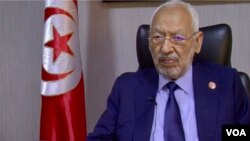Ennahdha categorically denies the claims that its leader, Rached Ghannouchi, and one of his deputies were involved in sending fighters abroad, which have recently resurfaced as the president tightens his grip on the judiciary.
Ghannouchi arrived at the headquarters of the anti-terror centre on Monday afternoon for questioning, according to an AFP reporter in the capital Tunis, several hours after his deputy, former prime minister Ali Laarayedh.
After the 2011 overthrow of dictator Zine El Abidine Ben Ali, thousands of Tunisians joined the ranks of jihadist organisations, most notably the Islamic State group in Syria and Iraq, but also in neighbouring Libya.
Critics of the party and some politicians accuse Ennahdha -- which played a central role in the country's post-Ben Ali politics until a power grab by President Kais Saied last year -- of having facilitated the departure of militants for war zones.
Saied seized wide-ranging powers in a dramatic move against the Ennahdha-dominated parliament in July last year, concentrating almost all powers in the presidency and later pushing through a constitution enshrining his one-man rule.
Ennahdha decried on Sunday attempts "to use the judiciary to tarnish the opposition's image" and implicate its leaders in "fabricated affairs".
The probe against Ghannouchi and Laarayedh, the party said in a statement, was meant to "distract the public" from dealing with economic and social issues and the "worsening conditions" in the country.
Ghannouchi, 81, was questioned in July by the same anti-terror unit in a probe into allegations of corruption and money laundering linked to transfers from abroad to the charity Namaa Tunisia, affiliated with Ennahdha.
Tunisia Oppo Nabbed for Questioning

Two leaders of Tunisia's Islamist-inspired opposition party Ennahdha were called in Monday for questioning by an anti-terror unit, accused of sending jihadist militants to Syria and Iraq, the movement said.
TUNIS —




